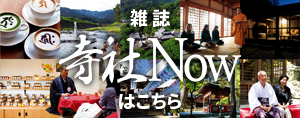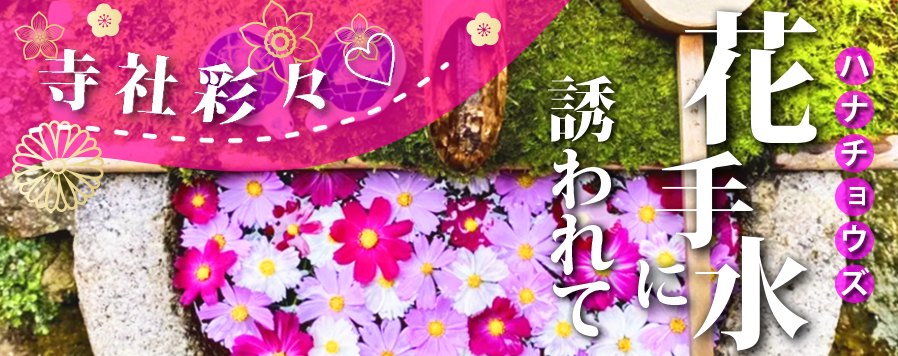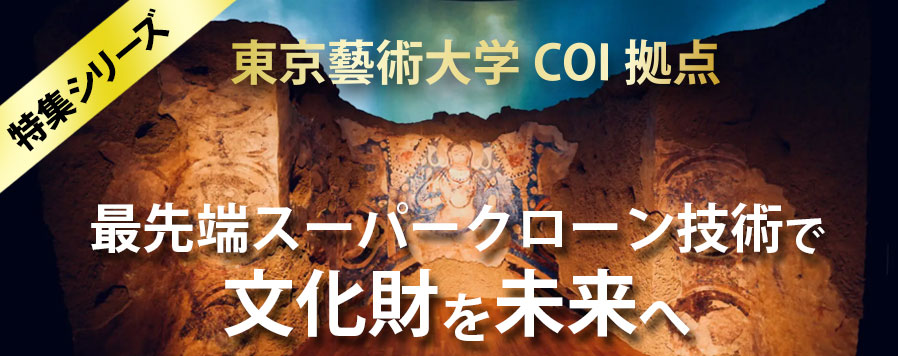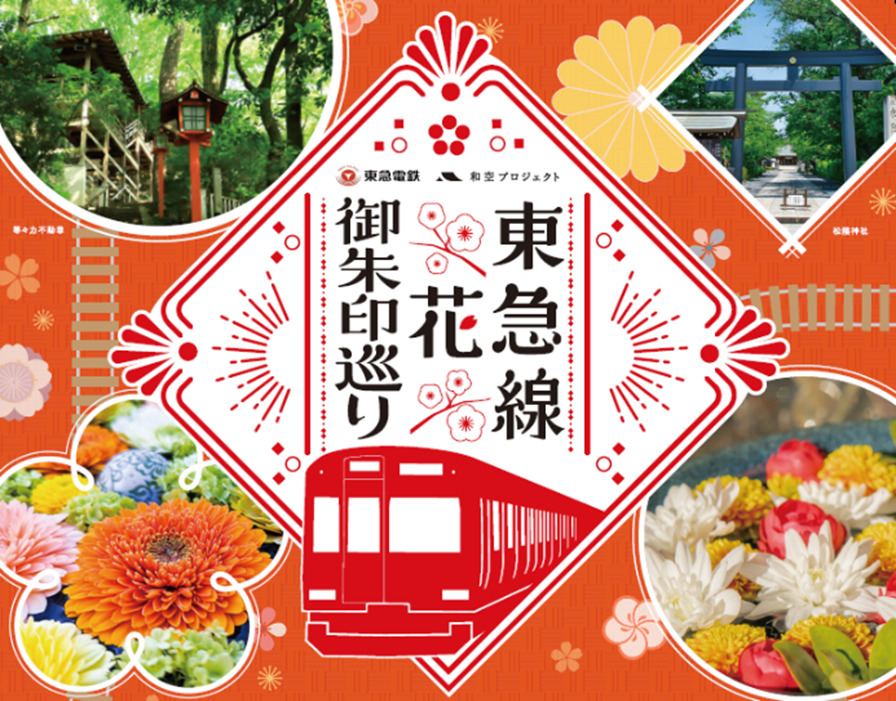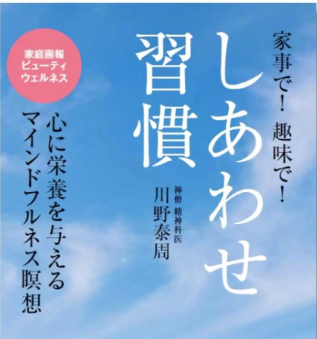宿坊を運営しているのは、院代の菊池雄大氏。大間で生まれ育ち、海峡を挟んだ北海道の高校時代は、元メジャーリーガー田中将大投手の1年後輩として甲子園でもプレーした。東京の仏教系大学で学び、曹洞宗の大本山永平寺で修行後、東京や北海道など各地の寺院での務めを経て地元に戻った。父が切り盛りする本院とは別に、山の中で空き寺になっていた普賢院を再興して宿坊を開いた。
The lodge is run by Yudai Kikuchi, the head of the institute. He was born and raised in Oma, and during his high school years in Hokkaido, across the strait, he played in the Koshien National High School Baseball Tournament as a year junior to former major league pitcher Masahiro Tanaka. After studying at a Buddhist university in Tokyo and training at Eiheiji Temple, the head temple of the Soto sect of Buddhism, he served at temples in Tokyo, Hokkaido, and elsewhere before returning to his hometown. In addition to the main temple run by his father, he rebuilt Fugenin, a vacant temple in the mountains, and opened a lodging house there.

父・福蔵寺住職の菊池泰進さんと、その別院・普賢院院代の雄大さん親子。地元のために寺院ができることを考えたい、という思いは同じ。 The father, Taishin Kikuchi, abbot of Fukuzoji Temple, and his son Yudai, abbot of Fugenin, a branch temple of Fukuzoji Temple. They share the same desire to think about what the temple can do for the local community.
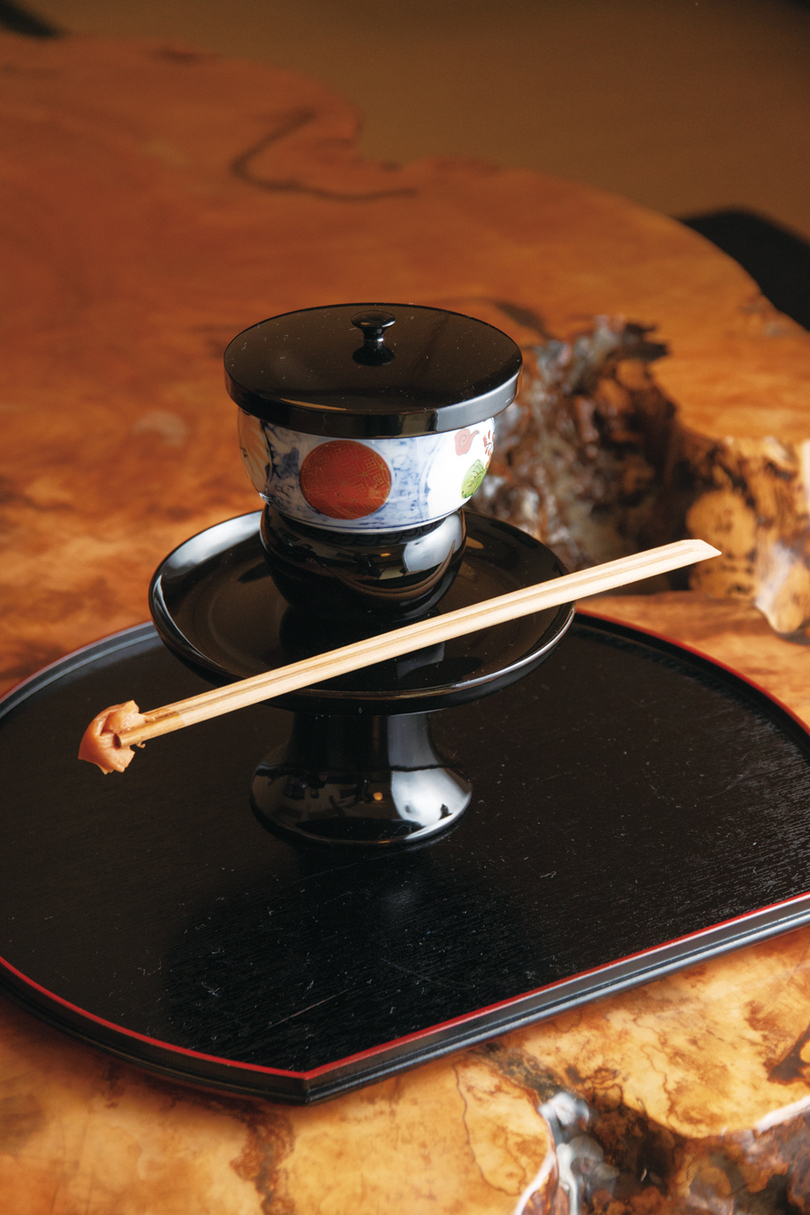
宿坊に着いたらまず曹洞宗で出される梅湯(ばいとう)でおもてなし。 When you arrive at your lodgings, you are first treated with baito (plum water), which is served in the Soto sect of Buddhism.
地元のため、寺院のために For the local community and for the temple
「地元に戻るたびに、このままでいいのだろうか、と自問自答していました。大間の町も、自坊の将来も。そんな時によそで宿坊が新たに人を呼んでいることを知り、開設を決意したんです。生まれ育った寺院へ戻ることを決意したときにこの思いを住職(父)に伝えたら、ふたつ返事で賛成していただけました」
Every time I returned to my hometown, I asked myself, “Is this the way things are going to be? I wondered about the town of Oma and the future of my own lodge. It was at that time that I learned that there was a new lodging house attracting people from other places, and I decided to open one. When I decided to return to the temple where I was born and raised, I told the abbot (my father) about this idea, and he agreed with my decision.
かつて大間は、下期半島の名所でもある恐山を訪れる参拝客が、ついでに立ち寄る観光地として賑わっていた時期もある。しかし、恐山を支えていた東北地方沿岸部の人たちの多くが、東日本大震災で大きなダメージを受けて恐山詣がほぼ消滅してしまった。その影響で大間も変わってしまった。そうこうするうちに過疎化が進む。
There was a time when Oma was a popular tourist destination for visitors to Osorezan, a famous mountain in the lower peninsula of Japan. However, many of the people along the Tohoku coast who supported Osorezan were severely damaged by the Great East Japan Earthquake, and the Osorezan pilgrimage almost disappeared. This has changed Oma as well. In the meantime, depopulation has continued.
菊池院代は大学時代の卒論で、地方の寺院が生き残る条件を深く考察した。生存の条件は3つ、①瀬戸内寂聴のような人を惹き付けることのできるスター僧侶がいること、②経済的基盤となる檀家が相当数あること、③寺院存続に必要な最低限の現金収入があること。地元に戻っても、このうちの①のスター性などあるわけもないし、②の檀家も過疎地にあって10年後20年後はわからない。マグロにしても海流が変わればいなくなってしまうことも考えられる。そうなれば檀家も厳しい。ならば③の現金収入を確保する必要がある。その手段のひとつとして、さまざまな思考実験を繰り返したすえに、宿坊の運営にたどりついた。
In his graduation thesis at university, Indayo Kikuchi took a deep look at the conditions for the survival of local temples. There are three conditions for survival: (1) the presence of a star priest like Jakucho Setouchi who can attract people, (2) a substantial number of danka (parishioners) as an economic base, and (3) a minimum cash income necessary for the temple to continue to exist. Even if they return to their hometowns, there is no way they will have the star power of (1), and the parishioners of (2) are in depopulated areas and will not be around for 10 to 20 years. Even tuna could disappear if the ocean currents change. If that happens, it will be difficult for the parishioners. If this is the case, it is necessary to secure the cash income mentioned in (3). As one means of achieving this, after repeated thought experiments, we came up with the idea of operating shukubo (lodging houses).
とはいえ、突然お寺が宿泊を提供しますと言ったところで、はるばる下北半島の先端までそれを目的として人が来てくれるかは疑問だ。そこで、日本中に知られている「大間のマグロ」を前面に打ち出す戦略をとることにした。そしてその思惑は当たった。
However, it is doubtful that people would come all the way to the tip of the Shimokita Peninsula for the purpose of staying overnight if a temple suddenly announced that it would provide lodging. So, they decided to adopt a strategy of promoting the “Oma tuna,” which is well known throughout Japan. And the idea worked.
ただの思いつきではない。地元で生まれ育った菊池さんを支えるマグロ漁師の仲間たちもいる。命がけの漁場の船上から、「いいのが揚がったぞ!漁港で待ってろ!」と連絡がくる。100Kg以上のマグロは東京方面へ出荷されるが、それより小さいマグロは地元大間に卸される。
It was not just an idea. Born and raised in the area, Kikuchi is supported by his fellow tuna fishermen. From the risky fishing grounds on board the boat, they told him, “We’ve landed a nice one! Wait for me at the fishing port! Tuna weighing more than 100 kilograms are shipped to Tokyo, while smaller tuna are shipped to Oma, his hometown.
「そもそも夕食が曹洞宗の精進料理では、量が少なくお腹がすいてしまうかもしれません。そこで朝食に精進料理を提供して、夜はマグロをいろいろなメニューで楽しんでいただくことにしました」
If dinner is vegetarian Soto Zen cuisine to begin with, the portions are small and you might get hungry, so we offer vegetarian food for breakfast. So we decided to serve vegetarian food for breakfast and offer a variety of tuna dishes in the evening.”
などといかにも宿主のようなことを言っているが、マグロをはじめ夕食に並ぶ食材の一つひとつに大間の物語がある。つながりがある。
Although he sounds like an innkeeper, each of the ingredients for dinner, including the tuna, has a story to tell about Oma. There is a connection.
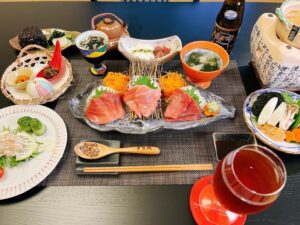
夕食のマグロは、赤身、中トロ、大トロの食べ比べに山かけ。旬の魚介やアワビ、もずくなど大間で獲れる地のモノを提供する。手摘みの大間産岩のりで握るおにぎりもことのほか美味。同じ大間町のお寺(崇徳寺)で醸造している寺ビールもありがたくうれしい Tuna for dinner is served with a comparison of red, medium, and large fatty tuna. Seasonal seafood, abalone, mozuku seaweed, and other local delicacies caught in Oma are served. The rice balls made with hand-picked Oma-grown iwana seaweed are also extremely tasty. The temple beer brewed at the Sotokuji temple in Oma is also a welcome treat.
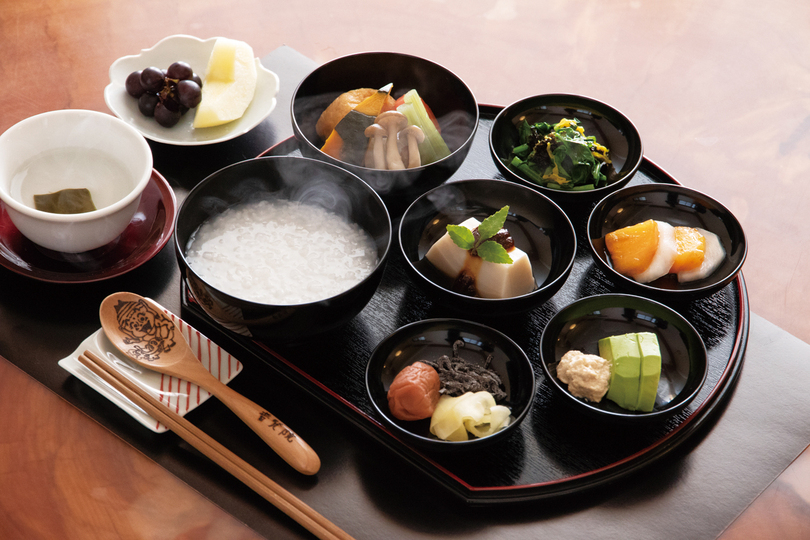
翌日の朝食はおかゆを中心に胡麻豆腐や炊きものなど Breakfast the next day is mainly porridge, sesame tofu, cooked food, etc.
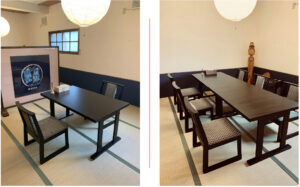
食事は寝起きする宿坊の建物とは別棟の食堂で。宿泊ゲストとの会話が楽しいし何よりも学びになると院代 Meals are served in the dining room, which is in a separate building from the shukubo building where the guests sleep and wake up. I ndayo says that he enjoys talking with the guests and, above all, learning from them.
ゲストと共に食事をしながら、そうした土地の物語やつながりを話す。ときには聞かれれば仏教のこと、そして自分のことなども気ままに話をする。宿坊を始めてから知り合った近隣の寺院で醸造している地(寺)ビールも会話を盛り上げる名脇役となっている。
Over meals with guests, I tell them stories and connections to the land. Sometimes, if asked, he will talk about Buddhism or even about himself. The local (temple) beer brewed at a nearby temple, which he has become acquainted with since starting the shukubo, also plays a supporting role in enlivening the conversation.

